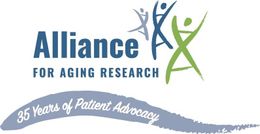Are You a Vaccine Truth-Teller?
Get the Facts About Vaccines for You and Your Family

Social media sites are great ways to stay in touch with loved ones, but they can also be a major source of misinformation and disinformation, especially since the start of the COVID-19 pandemic.
This can be true when it comes to vaccines. Unfortunately, social media has provided an opportunity for lies about vaccines to be spread largely unchecked. An analysis of millions of social media posts published in Science found that false news stories were 70% more likely to be shared than true stories.
Misinformation has an impact. According to a study published in Nature, brief exposure to COVID‑19 vaccine misinformation and disinformation caused the number of people willing to get vaccinated to go down 6.4%.
It's not surprising that people don't know what to trust. A recent survey of 1,000 Americans conducted by Engine Group on behalf of the Alliance for Aging Research (a nonprofit organization dedicated to accelerating the pace of scientific discoveries and their application to vastly improve the universal human experience of aging and health), found that only 43% of respondents are very confident or somewhat confident about the credibility of vaccine information they see online.
Science has demonstrated vaccines are safe and effective. Yet only 63% of Americans ages 12 and up are fully vaccinated against COVID-19. Older adults are doing better with the largest vaccination rate against COVID-19, with 82% of people 65 and older fully vaccinated. The Alliance for Aging Research is committed to bringing those numbers as close to 100% as possible.
The COVID-19 vaccine isn't the only shot older adults, and all individuals, should be getting this year. The annual influenza ("flu") vaccine is particularly important for older adults, who are at a higher risk of getting seriously ill or even dying from the flu.
In order to get more of the facts on vaccines to older adults and their families, the Alliance released new resources in our Our Best Shot campaign. "Our new resources provide older adults with the information they need to fight against misinformation and disinformation when it comes to vaccines," says Lindsay Clarke, vice president of health education and advocacy at the Alliance.
The Truth About Vaccines for You and Your Loved Ones
What's the difference between misinformation and disinformation? It comes down to intent. Misinformation is incorrect and false information that is shared without an intent to purposely deceive others, while disinformation is intentionally false and meant to deceive. Both are extremely harmful and have led people to reject science-backed practices like wearing a mask and getting vaccinated.
The Alliance's new fact sheet, "Our Best Shot: The Truth About Vaccines for You and Your Loved Ones," provides the facts about vaccines, as well as tips for spotting misinformation and disinformation. It also debunks common myths about vaccines and COVID-19 vaccines in particular, giving older adults the scientific facts to counter potential misinformation.
"We believe that older adults have an important influence on their friends and family, which is why it's so important for them to know how to spot misinformation and disinformation," Clarke says.
Here are some of the tips outlined in the fact sheet to spot misinformation and disinformation on social media:
Check the source: Do you know and trust the author or publication? Can you find other trusted sources that are saying the same thing? If you're not sure, don't share.
Check the Date: Is the information recent and up-to-date? Make sure you know when the information was released.
Check the Data: Does the author or publication back up their claims with evidence from peer-reviewed journals and other established and reputable sources? Make sure there's rigorous science behind the claims they make.
Question the Motive: Is the article or post sensational or designed to play on your emotions? If you can't trust it, don't share it.
Find Reliable Sources: Talk to your health care provider if you have questions about something you've read or heard and to discuss which vaccines are right for you.
"It's important for everyone to consider these questions and make sure they have reliable information before they share it with others," Clarke says.
Preventing and Treating the Flu
A recent survey of 1,000 Americans conducted by Engine Group on behalf of the Alliance found that 75% of respondents have never heard of a high-dose or adjuvanted flu vaccine — both of which are designed to boost the immune responses of adults 65 and older who often have declining immune systems.
The Alliance's new educational video, "Our Best Shot: Preventing and Treating the Flu," encourages older adults to speak with their health care providers to learn about the different flu vaccines and which one is right for them.
This short film explains what the flu is and how it spreads, describes what to do if you get the flu and highlights the importance of preventive efforts, especially vaccination.
"Many people have forgotten the importance of getting the flu vaccine as the COVID-19 pandemic continues. Getting a flu shot is a proactive step you can take to protect yourself and loved ones and help reduce symptoms caused by influenza that resemble COVID-19," said Clarke. It's important to not only stay as healthy as possible as the pandemic continues, but to keep additional strain off a health care system that in many places can't handle more hospitalizations."
We know that older adults are often trusted resources within their families and communities. The Alliance is giving older adults the facts about vaccines and teaching more people how to spot disinformation and misinformation. To find out more about facts and resources so you can share them, visit agingresearch.org/ourbestshot.

The Alliance for Aging Research is the leading nonprofit organization dedicated to accelerating the pace of scientific discoveries and their application to vastly improve the universal human experience of aging and health. The Alliance believes advances in research help people live longer, happier, more productive lives and reduce health care costs over the long term.

